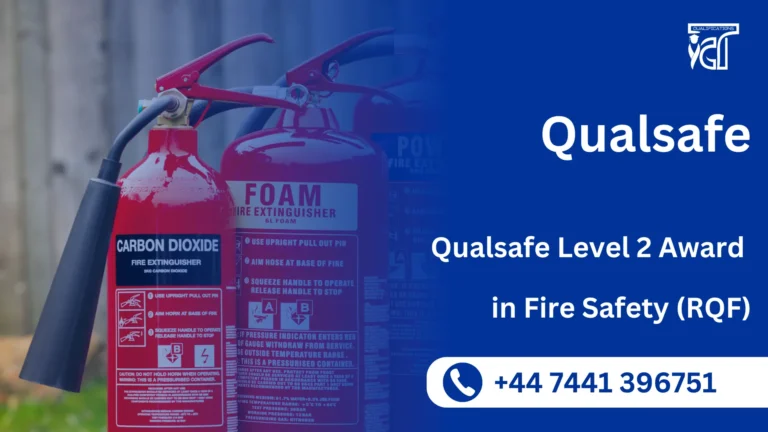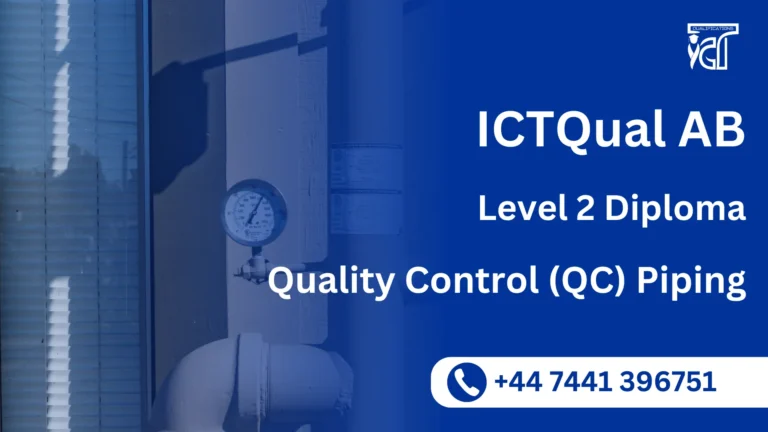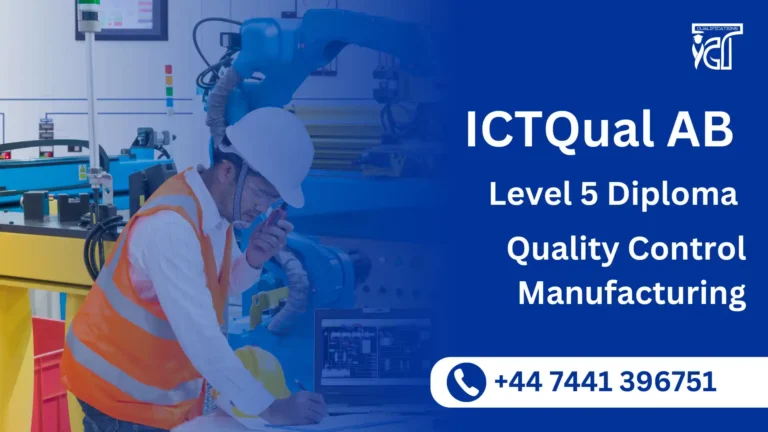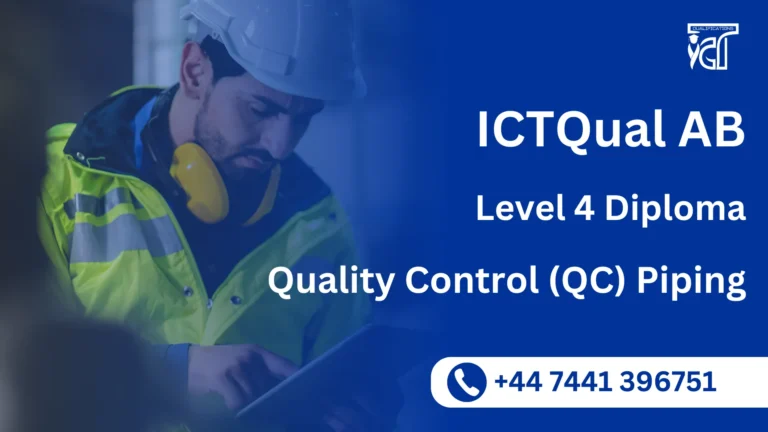The QualCert Level 2 Diploma in Quality Control (QC) Mechanical is an entry-level vocational qualification designed to introduce learners to the basic principles and practices of quality control within the mechanical engineering field. This course is ideal for individuals who are new to the industry and looking to start a career in mechanical inspection, production support, or quality assurance roles.
Through a practical and easy-to-understand curriculum, learners will gain foundational knowledge in quality control processes, basic inspection techniques, measurement tools, safety procedures, and the importance of maintaining standards in mechanical systems. The course also emphasizes workplace discipline, basic documentation, and teamwork in an industrial setting.
Whether you are a school leaver, a vocational trainee, or someone seeking your first technical qualification, this diploma provides a structured learning path to develop your confidence and job readiness. It lays the groundwork for employment in junior QC roles and opens the door to further studies in mechanical engineering or higher-level QC programs.
QualCert Level 2 Diploma in Quality Control (QC) Mechanical
The QualCert Level 2 Diploma in Quality Control ( QC ) Mechanical comprises several study units designed to provide learners with a comprehensive understanding of QC principles and practices in the mechanical sector. Below is the qualification structure, including the Total Qualification Time (TQT) 210, Guided Learning Hours (GLH) 150, and 42 Credits associated with the program.
| Unit Ref# | Unit Title | Credit | GLH | TQT |
| QC12008 – 1 | Advanced Mechanical Quality Assurance | 7 | 25 | 35 |
| QC12008 – 2 | Calibration, Inspection, and Testing Techniques | 7 | 25 | 35 |
| QC12008 – 3 | Manufacturing Process Control and Quality | 7 | 25 | 35 |
| QC12008 – 4 | ISO Standards for Mechanical Industries | 7 | 25 | 35 |
| QC12008 – 5 | Statistical Quality Analysis | 7 | 25 | 35 |
| QC12008 – 6 | Advanced Non-Destructive Testing (NDT) | 7 | 25 | 35 |
GLH (Guided Learning Hours) and TQT (Total Qualification Time) are terms commonly used in vocational qualifications to help define the amount of time a learner is expected to spend on their studies.
1. GLH (Guided Learning Hours)
GLH refers to the number of hours a learner spends being directly taught, supervised, or supported during their course. This includes the time spent in activities such as:
- Classroom instruction
- Practical workshops
- One-on-one tutoring or mentoring sessions
- Online learning sessions with tutor support
In other words, GLH represents the time that learners are actively engaged with their instructors or learning activities.
2. TQT (Total Qualification Time)
TQT represents the total amount of time a learner is expected to invest in completing a qualification, including:
- GLH (Guided Learning Hours): Time spent on direct learning, as explained above.
- Self-Directed Learning: This includes time spent on independent study, research, assignment completion, preparation for exams, and any other work the learner does outside of direct teaching hours.
TQT is a broader measure that includes all the time required to achieve the qualification. It helps learners and employers understand the overall commitment required for the qualification.
Key Differences Between GLH and TQT:
- GLH focuses on direct learning with guidance or supervision.
- TQT includes GLH as well as independent study time and other learning-related activities.
Example:
If a qualification has a TQT of 600 hours and a GLH of 250 hours, it means the learner should spend 250 hours in direct learning (classroom, online, or tutor-led sessions) and 350 hours on independent study or research.
Advanced Mechanical Quality Assurance
- Understand advanced principles of quality assurance in mechanical engineering.
- Implement quality management systems to improve mechanical product reliability.
- Develop strategies for continuous improvement and defect prevention in mechanical processes.
Calibration, Inspection, and Testing Techniques
- Perform precise calibration of mechanical measuring instruments.
- Apply advanced inspection techniques to assess product conformity.
- Utilize mechanical testing methods to evaluate material and component performance.
Manufacturing Process Control and Quality
- Monitor and optimize manufacturing processes for quality consistency.
- Implement process control measures to reduce variability and defects.
- Apply quality control tools such as Six Sigma and Lean methodologies.
ISO Standards for Mechanical Industries
- Understand key ISO standards relevant to mechanical quality control, including ISO 9001 and ISO 16949.
- Ensure compliance with international regulations and industry best practices.
- Implement quality documentation and audit procedures to maintain ISO certification.
Statistical Quality Analysis
- Apply statistical techniques to analyze and improve mechanical quality control processes.
- Use control charts, process capability studies, and failure mode analysis to assess quality performance.
- Interpret data-driven insights to make informed quality improvement decisions.
Advanced Non-Destructive Testing (NDT)
- Understand the principles of advanced NDT techniques in mechanical quality control.
- Apply ultrasonic, radiographic, and eddy current testing for defect detection.
- Assess mechanical components without causing damage to ensure product integrity.
Course Benefits: QualCert Level 2 Diploma in Quality Control (QC) Mechanical
The QualCert Level 2 Diploma in Quality Control (QC) Mechanical provides a strong foundation for individuals seeking to start a career in mechanical quality control. It offers both personal and professional growth opportunities by introducing learners to essential industry practices and skills.
Key Benefits:
- Introduction to Quality Control Fundamentals
Learn the basic principles of QC in mechanical environments, including inspection methods, visual checks, and measurement basics. - Practical, Job-Ready Skills
Develop hands-on skills using common mechanical tools, gauges, and instruments used in entry-level quality control tasks. - Ideal Starting Point for Beginners
Designed for individuals with little or no prior experience in mechanical engineering or quality control, making it highly accessible. - Employment Opportunities in Technical Fields
Prepares learners for junior roles such as QC Assistant, Inspection Helper, or Workshop Support Technician in sectors like manufacturing, fabrication, and maintenance. - Focus on Workplace Safety and Discipline
Gain an understanding of workplace safety, hygiene, and behavior—key components of working in industrial and engineering environments. - Pathway to Higher Qualifications
Acts as a stepping stone to Level 3 and higher-level diplomas in Mechanical QC, Engineering, or Quality Assurance. - Boosts Confidence and Job Readiness
Builds learner confidence through structured learning and practical tasks, increasing employability and readiness for on-the-job responsibilities. - Recognition in Industry
Offers a certified qualification that is valued by employers and adds credibility to your profile when applying for technical roles. - Improved Understanding of Mechanical Components
Learn to identify common mechanical parts, basic engineering drawings, and production processes. - Supports Career Progression
Equips you with the foundation needed to grow in the quality control field, with the potential to take on more technical or supervisory roles over time.
This diploma is an excellent first step into the mechanical QC profession, helping learners gain the basic knowledge, discipline, and skills required to thrive in an industrial setting.
Ideal Learner for QualCert Level 2 Diploma in Quality Control (QC) Mechanical
The ideal learner for the QualCert Level 2 Diploma in Quality Control (QC) Mechanical is someone who is beginning their journey into the mechanical or technical workforce and is looking to build a strong foundation in quality control practices. This course is designed to be accessible and practical, making it suitable for a wide range of learners.
This course is ideal for:
- School Leavers and Early-Career Starters
Individuals who have recently completed secondary education and want to begin a technical career in mechanical quality control or manufacturing. - Vocational and Technical Training Students
Learners currently enrolled in or recently completed vocational courses in mechanical trades or industrial technologies. - Workshop Assistants and Support Staff
Those already working in mechanical or production environments in junior roles who want to formalize their knowledge and advance in quality-related roles. - Career Beginners with No Prior Experience
Individuals with little or no experience in the industry who want a structured introduction to quality control and mechanical inspection work. - Apprentices and Trainees
Entry-level workers undergoing apprenticeships who require a certified qualification to support their practical training. - Career Changers
People from non-technical backgrounds seeking to switch into the mechanical or industrial sector through a recognized and beginner-friendly qualification. - Individuals Seeking Job Readiness Skills
Those looking to improve their employability through hands-on, industry-aligned training that can lead directly to job opportunities in mechanical QC or production support.
This course is perfect for learners who are hands-on, eager to learn, and interested in contributing to the safety, precision, and quality of mechanical systems in various industries.
Entry Requirements
Entry Requirements: QualCert Level 2 Diploma in Quality Control (QC) Mechanical
The QualCert Level 2 Diploma in Quality Control (QC) Mechanical is designed to be accessible to beginners and early-career individuals who want to enter the field of mechanical quality control. Entry requirements are minimal to encourage wide participation while ensuring learners are prepared to succeed.
- Age Requirement:
- Applicants must be at least 16 years old at the time of enrollment.
- Educational Background:
- Basic secondary education is recommended (completion of Grade 8 or higher).
- No formal qualification in engineering or quality control is required.
- English Language Proficiency:
- Learners should have basic reading and writing skills in English. This can be demonstrated by:
- Completion of prior education in English, or
- A simple language assessment or interview by the training provider.
- Learners should have basic reading and writing skills in English. This can be demonstrated by:
- Technical Interest or Aptitude:
- A general interest in mechanical systems, tools, or industrial work is encouraged but not mandatory.
- No Prior Experience Required:
- This course is suitable for individuals with no previous work experience in mechanical or quality control fields.
Register Now
Qualification Process
Qualification Process for the QualCert Level 2 Diploma in Quality Control (QC) Mechanical
- Self-Assessment:
Begin by evaluating your eligibility to ensure you meet the qualification requirements, including work experience, knowledge, and language proficiency. - Registration:
Complete your registration by submitting the required documents, including a scanned copy of a valid ID, and paying the registration fee. - Induction:
An assessor will conduct an induction to confirm your eligibility for the course and explain the evidence requirements. If you do not meet the criteria, your registration will be canceled, and the fee will be refunded. - Assignmnets & Evidence Submission:
Provide all assignmnets and the necessary evidence based on the assessment criteria outlined in the course. If you are unsure of the required evidence, consult with the assessor for guidance on the type and nature of evidence needed. - Feedback and Revision:
The assessor will review your submitted evidence and provide feedback. Evidence that meets the criteria will be marked as “Criteria Met,” while any gaps will be identified. You will be asked to revise and resubmit if needed. - Competence Evidence:
Submit final evidence demonstrating that all learning outcomes have been met. This evidence will be marked as “Criteria Met” by the assessor once it is satisfactory. - Internal Quality Assurance (IQA):
The Internal Quality Assurance Verifier (IQA) will review your evidence to ensure consistency, quality, and compliance with standards. - External Verification:
The IQA will submit your portfolio to QualCert External Quality Assurance Verifiers (EQA) for final confirmation. The EQA may contact you directly to verify the authenticity of your evidence. - Certification:
Upon successful completion of all checks, QualCert will issue your official certificate, confirming that you have attained the QualCert Level 2 Diploma in Quality Control (QC) Mechanical.







